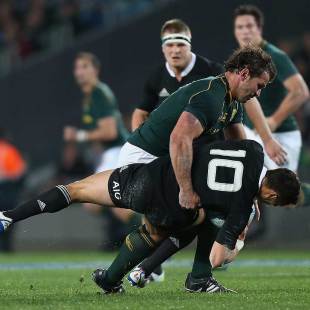|
South African Rugby
Nick Mallett seeks cricket-style DRS in rugby
September 18, 2013

Bismarck du Plessis received a yellow card for a legitimate tackle
© Getty Images
Enlarge
Nick Mallett has criticised the International Rugby Board (IRB) for what he believes is a failure to eradicate poor decision-making by referees, and he says on-field captains should have a right of appeal. In the wake of the furore over the sin-binning of South Africa hooker Bismarck du Plessis for his tackle on Dan Carter in The Rugby Championship Test against New Zealand in Auckland, Mallett said the IRB admission that referee Romain Poite got it wrong was too late. Du Plessis' red card has been rescinded, but Mallett said it was too late as the damage had been done, Poite's decision having possibly changed the outcome of the game and the tournament. "Poite will be sanctioned by the referees' association, but the Springboks don't get the opportunity to replay the game," Mallett said on South Africa's BallzRadio. "The result stands. It was an unfair contest from the moment Bismarck was sent off after half-time. That decision guaranteed that the Springboks would lose the game. It almost certainly guaranteed that the All Blacks would get a bonus point." As a demonstration of the frustration with the refereeing system of the moment, Mallett cited the Springboks' Test against Argentina in Mendoza, where captain Jean de Villiers complained about biting and eye-gouging to the referee Steve Walsh. The official said he would refer the incident to the citing commissioner, but Mallett said that wasn't enough.
"It doesn't matter what happens afterwards. If you're a player, you want the card or the penalty there and then so you can translate that to points. With two assistant referees on the side of the field and the benefit of slow motion replays and the TMO up in the stands, there is no reason why an official should make a hasty decision on the field and what was inexcusable was that he [Walsh] didn't ask for an opinion from the TMO." Mallett said the laws were too complicated for one man to be making all the crucial decisions, saying that referees were under tremendous pressure and were influenced by home crowds. The games had too much at stake for officials to be making mistakes, Mallett said. "A player gets dropped, he loses his contract, a coach gets fired, a referee is policed by other referees, but players' futures and careers are on the line, therefore you have to get decisions right," he said. Mallett said that he would like to see a challenge system similar to that used in cricket whereby captains could ask for the TMO to be consulted.
© Sportal
|
Live Sports
Communication error please reload the page.
-
Football
-
Cricket
-
Rugby
-
- Days
- Hrs
- Mins
- Secs
F1 - Abu Dhabi GP
Abu Dhabi Grand Prix December 11-131. Max Verstappen ()
2. Valtteri Bottas (Mercedes)
3. Lewis Hamilton (Mercedes)
4. Alexander Albon ()
5. Lando Norris ()
6. Carlos Sainz Jr ()
-
ESPNOtherLive >>
Snooker - China Open
Tennis - Miami Open

